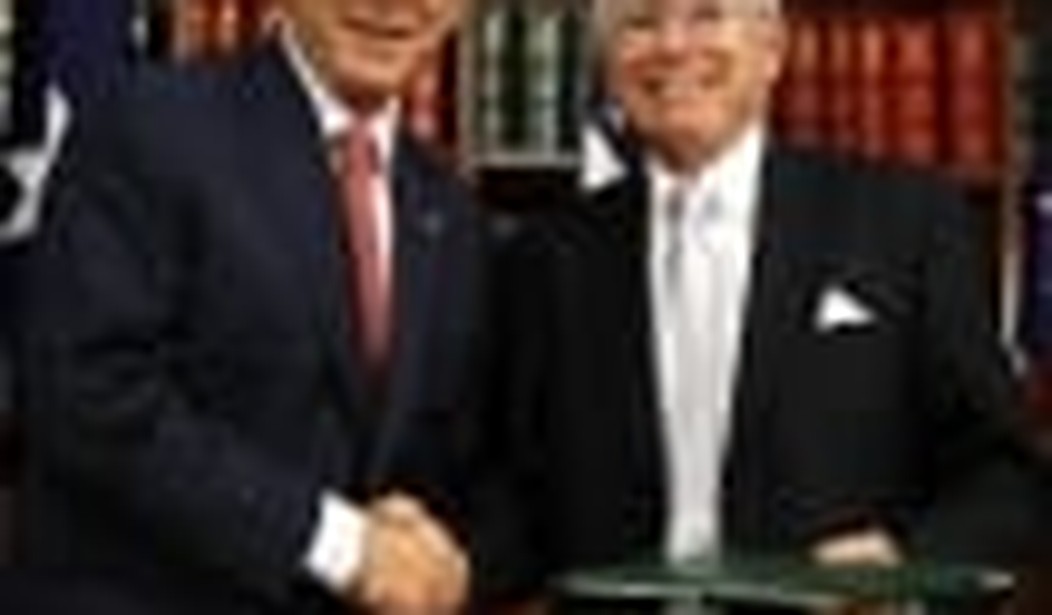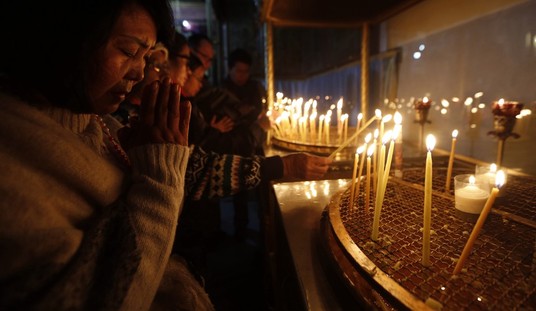Australian opinion polls are unanimous that Prime Minister John Howard’s long-standing conservative government will lose office on Saturday in a landslide election win to the Australia Labor Party, led by Queenslander Kevin Rudd.
If the Howard Liberal-National Party coalition Government happens to be re-elected on Saturday, it will be the biggest polling embarrassment in any developed country since Truman beat Dewey in 1948.
It may be safely assumed that the White House is praying for just such a boilover.
President Bush, who famously dubbed Howard the ‘man of steel’, has since 9/11 learnt to rely on Howard’s support in international forums, and in building up the wider Anglosphere commitment to the fight against Islamic terror.
His support for US policies has been stalwart and whole-hearted. And it has been important.
Among the world’s conservative leaders, Howard has become something of a senior statesman. With him out of the picture, the atmospherics and even the substance of some of the world’s Anglosphere gatherings and other ‘coalitions of the willing’ wouldn’t be the same.
The Australian contribution is currently most prominently represented, symbolically and operationally, by military forces in both Iraq and Afghanistan. (It is widely known that one of General Petraeus’s senior advisers has been an Australian counter-insurgency specialist.) If Howard wins on Saturday, those commitments continue.
Of course, if the Democrats take the White House next year, the dynamics of the Australian connection will change in any event. It seems to fair to assume that Labor’s Kevin Rudd would get on better with, say, Hillary Clinton, than Howard would. (Whether that would be a good thing or a bad thing is of course another matter.)
Another point to keep mind: if Howard is re-elected Prime Minister, he is pledged to resign the Prime Ministership toward the end of the coming term – say, late in 2009. It is assumed that Peter Costello, the current Treasurer, would then take over. Costello would bring broadly the same principles to bear as Howard on Australian foreign policy, but in a somewhat more relaxed ‘boomer’ style. (Another long shot possibility is that Howard’s government is returned on Saturday but Howard loses his own parliamentary seat. Costello would then be Prime Minister sooner than most people imagined.) It is also worth bearing in mind that Costello, a philosophical republican, is much less the Anglophile than Howard.
What of a Rudd Labor Government?
Yes, if he’s elected Rudd will keep Australian forces in Afghanistan. But US requests for new deployments or changed deployments, in Afghanistan or elsewhere, will not be so readily agreed to as in the past. Most importantly, Rudd will withdraw Australian combat troops from Iraq. If he wavers on that (and just conceivably, he may) there’ll be no shortage of old-style Labour lefties sitting next to him and behind him on the government benches to stiffen his resolve.
Some conservative commentators point out that Rudd has left himself some wriggle room on this. Labor policy is for withdrawal to be managed ‘in consultation’ with the US. And it’s noted that the Australia ‘combat troops’ to be withdrawn from Iraq doesn’t mean ‘all troops’ will be withdrawn. But all this careful parsing may reflect the wishful thinking of the commentators. Rudd often sounds just like an Australian Harry Reid: “On anyone’s measure, the Iraq war has failed… Four years after the invasion… fighting still rages across the country, weapons of mass destruction remain elusive and terrorism has only escalated…” All that’s on his web page.
‘Kevin07’ as he is known – the leader of the Labor Party for less than 12 months — is in truth no lefty. He does genuinely support the US alliance – but that won’t mean the same thing that it did under Howard. He fancies himself a bit of an intellectual – and is not altogether unjustified in that assessment. He is a polished and professional political performer who knows how to think on his feet; a one-time career diplomat in the Australian foreign service who learned fluent Mandarin during a long posting in China.
On the downside, China policy may just turn out to be a significant weakness of Rudd’s. The fact that he knows a lot about the place, and is proud of it, suggests he may harbour a yearning to leave his ‘mark’ on China policy. This could take unpredictable forms in international arenas.
Another policy area to watch will be climate change. The Rudd people are big on Kyoto. What this will mean in practice is not so clear. But it looks like the days when Australia stood with the US against Kyoto are gone. Now it will be the US standing more or less alone.
In his 11 years as Prime Minister, Howard has presided over the longest economic expansion in Australian history and achieved the lowest unemployment rate in some 30 years. True, he is now 68 and is starting to show it. Steadily rising interest rates are hurting mortgagees. Attempts to deregulate the labour market have also been clumsily handled and have left many workers feeling vulnerable. But such explanations hardly account for the sheer size of the expected cataclysm that the pollsters have coming his way Saturday. Life can be cruel.
Peter Day is a Sydney writer and former US correspondent for The Australian newspaper.









Join the conversation as a VIP Member